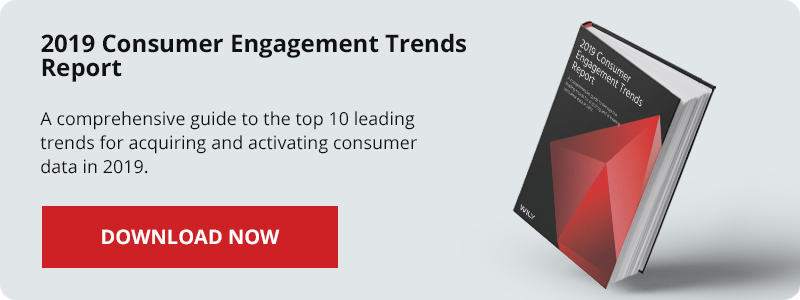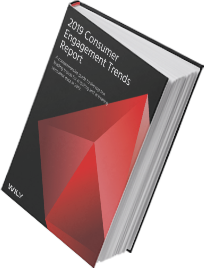In our latest Engagement Marketing Master Class: How to Acquire First-Party Data by Engaging...
Why It Pays to Acquire Consumer Data and How to Do It Correctly
 As marketers, collecting or acquiring data is all in a days work. Constantly crafting new ways to acquire information about your customers to achieve a 360 degree profile of them is the name of the game in today’s marketing profession. The ability to know the wants, needs, and behaviours of your buyers is invaluable and the only way for businesses to compete today.
As marketers, collecting or acquiring data is all in a days work. Constantly crafting new ways to acquire information about your customers to achieve a 360 degree profile of them is the name of the game in today’s marketing profession. The ability to know the wants, needs, and behaviours of your buyers is invaluable and the only way for businesses to compete today.
Consumers demand personalization, and the only way to accomplish this is to pull as much data about them as they are willing to give up. According to Harvard Business Review,
Many brands lead consumers down confusing purchase paths. The savviest ones simplify and personalize the route.
Therefore, it is integral for businesses to acquire consumer data that helps them understand how to create a frictionless shopping journey, and create content they care about. This will in turn yield bigger profits by reducing the burden on customer service, and developing more targeted marketing messages. Sounds pretty good, right?
Let’s dig deeper, and explore each way it pays to acquire consumer data, and how to accomplish this ethically, and in the best interests of consumers.
Why It Pays to Acquire Consumer Data
The benefits of collecting consumer data are numerous but there are a few areas worth pointing out. Here are some of the biggest reasons why it pays for organizations to acquire data:
 1. Enhancing the customer experience
1. Enhancing the customer experience
When businesses collect consumer data they are able to understand certain things such as when they exit an online experience. The ability to see potential improvements, or fix problems with your existing customer experience will yield massive returns for any business. Additionally, these insights can avoid customer service crises before they happen. Data insights help organizations make key operational changes in order to create the best possible experience for customers. Otherwise, organizations may have to guess what issues are causing customer frustration, or what for a bunch of angry customer support calls. All in all, having access to data not only prevents potential financial loss but bolsters an organizations ability to fire on all cylinders.
2. Guiding marketing strategy
Arguably one of the most vital reasons why it pays to acquire customer data is to help refine and guide marketing strategy. Once again, data gives marketers the ability to test and refine campaigns and make changes if necessary. The ability to track engagement, conversions, and more is a key indictor of whether a program is performing according to plan. Although it’s difficult to make big changes to more traditional advertising campaign, such as print, digital solutions make this versatility more possible. This allows marketers and designers to refine copy, make changes to imagery, or change the experience completely. Without instant access to data, organizations may spend millions of dollars on a marketing campaign that falls flat. Today, data and digital solutions allow marketers to pivot and make changes as needed. This is not only a massive time and cost savings to any business, but a way to maximize profits.
Additionally, this gives marketers the ability to tailor and personalize experience according to consumer preference. Marketers are now able to effectively segment data and target consumers that are most relevant. Thus, making the most out of marketing messages, and creating varied content to meet the needs of differing buyer personas. A great example of this use of dynamic content is Campbell’s Soup campaign.
3. Monetizing data
The first to reasons why it pays to collect data relate to optimizing business functions and driving returns. In this instance, data actually pays for itself. Companies that capture data also stand to profit from it. Data brokers, or companies that buy and sell information on customers, have risen as a new industry alongside big data. For businesses that are capturing large amounts of data, this represents an opportunity for a new stream of revenue.
For marketers and advertisers, access to third-party data can be extremely valuable, as it provides insight on consumers they otherwise would not have information about. In most cases, the business of collecting and selling data is done earnestly. For example, StatsCan regularly conducts surveys regarding a multitude of topics. Recently, it was revealed that it employs 400 people full-time to package up data and sell it to private businesses. As David Akin reports, the agency makes a lot of cash doing this; $113 million to be exact. You can watch the full report below:
How to Acquire Consumer Data
There are many ways in which businesses can collect consumer data. In fact, many businesses are inundated with consumer data they don’t know what to do with. Although, it all serves to build a complete consumer profile, it’s important to ensure you are acquiring data that is valuable to your business. The most obvious ways that businesses can acquire consumer data is by:
- Directly asking customers
- Indirectly tracking customers
- Appending other sources of customer data to your own
Most sophisticated organizations are enlisting all three methods to acquire consumer data. However, there are some more “creative” methods at work as well.
One example is location-based advertising, which utilizes an internet-connected device’s IP address (and the other devices it interacts with) to build a personalized data profile. This information is then used to target users’ devices with hyper-personalized, relevant advertising.
Finally, whenever discussing anything about data collection, it is important to note that data privacy regulations are changing the way businesses can capture, store, share and analyze consumer data. Recent GDPR compliance regulations make data sharing more difficult and data protection much more important. Although the regulations are technically only related to the EU, most global businesses are effected. Plus, it’s wise for all businesses to take caution whenever they collect data, as 62% of the consumers say they would blame the company for their lost data in the event of a breach, not the hacker.
In summation, acquiring consumer data is both integral to any business or marketing function today, and it can pay back in dividends. But it is wise for any organization who collects data to do so according to GDPR compliance and understanding that with great amounts of data comes great responsibility.
White Paper: Consumer Engagement Trends Report
Companies are connecting data and content to deliver on the notion of personalization. This report assists brand marketers and agencies looking to engage consumers in the digital-first era. It outlines 10 emerging trends and technologies that marketers need for personalizing communications along the customer journey.
WHAT’S INSIDE:
- The Value of Data-Driven Creatives
- 5G and Mobile-First Marketing
- Leveraging The Internet of Things (IoT)
- Experience-Driven Marketing
- Plus, So Much More!




